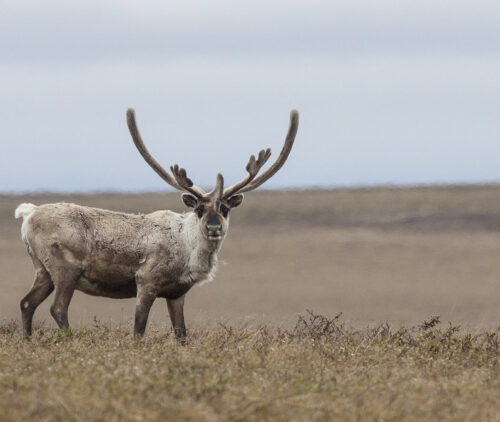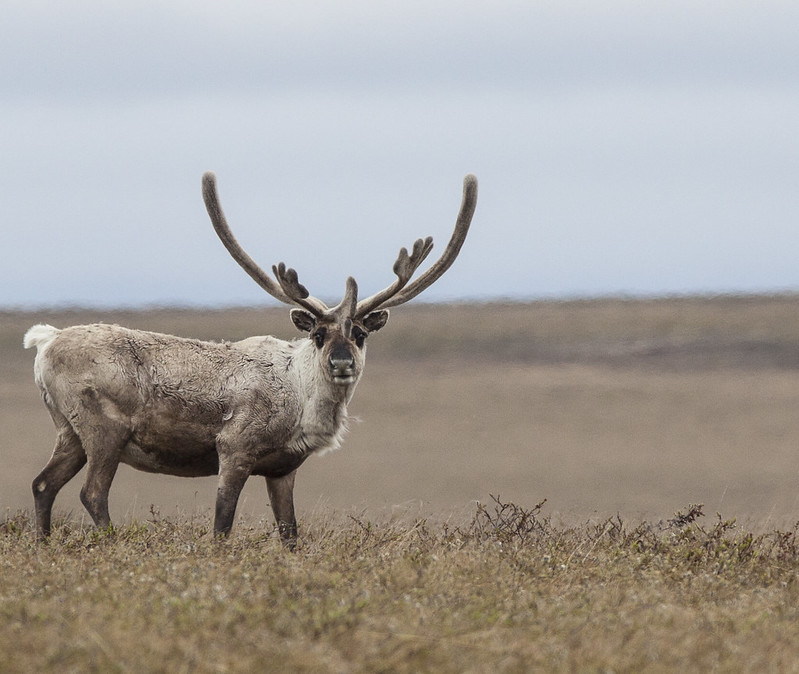More reaction is coming in as President Donald Trump’s administration is following through on promises to restore drilling rights for natural gas on Alaska’s National Petroleum Reserve, which the previous administration put a halt to amid pushback over the region’s other natural resources.
Here’s the Arctic Defense Campaign with a statement:
Trump Administration to Strike Down Critical Protections for Western Arctic, Opens 60-day Comment Period
Groups Respond Highlighting Grave Impacts to Indigenous Communities, Wildlife
(Washington, DC) — Yesterday, the Trump administration took steps to strike down critical protections for wildlife and Indigenous communities in the National Petroleum Reserve – Alaska (Western Arctic Reserve), opening a 60-day comment period on its proposal. The Trump administration took this action under Executive Order 14219.
Today’s announcement proposes to pull back a rule, which was finalized just one year ago, that provided stronger protections for 13 million acres of the Reserve’s designated Special Areas – which are integral to local people for food and their ways of life. These ecologically important lands in the Western Arctic include Teshekpuk Lake, Utukok Uplands, Colville River, Kasegaluk Lagoon, and Peard Bay. The rule also established a much-needed process and standards for creating and protecting additional Special Areas within the Reserve.
The previous administration developed the rule with robust input from scientists, wildlife experts, Indigenous communities, and the public, including more than 250,000 supportive comments from Americans across the country.
In response, Members of the Arctic Defense Campaign shared the following statements:
“The Department of the Interior finalized these protections for the Western Arctic just a year ago. So much time and effort went into conveying the importance of this land, it’s impossible to translate the importance of these lands instilled in us by our elders; this is heartwrenching. Science, traditional knowledge, and even human rights aren’t being taken into account; the proposal is not based on information, but predetermined and shortsighted ambitions. We will be calling on our Iñupiat allies and submitting comments urging the administration to keep these vital protections in place,” said Nauri Simmonds, Executive Director of Sovereign Iñupiat for a Living Arctic.
“Repealing these protections would ignore science, disrespect local communities, and put an already fragile Arctic ecosystem at further risk,” said Suzanne Bostrom, Senior Staff Attorney with Trustees for Alaska. “These lands protect vital wildlife habitat and provide food security for Indigenous communities. This proposal would hand over millions of acres in the Western Arctic to oil and gas drilling, contradicting Congress’ mandate to protect important areas in the Reserve.”
“By proposing to repeal these science-based regulations, the Trump administration aims to grease the skids for oil companies intent on industrializing even the most sensitive areas in the Western Arctic in pursuit of dirty oil that can have no place in our energy future. The administration should be working to develop a post-oil future for the region, not paving the way for outdated, destructive oil development,” said Erik Grafe, Attorney with Earthjustice.
“BLM is turning its back on the wildlife and habitat it is required to protect,” said Nicole Whittington-Evans, Defenders of Wildlife senior director of Alaska and Northwest programs. “The Reserve is home to an astonishing variety of wildlife, including polar bears, caribou, wolves, wolverines, musk oxen, and millions of migratory birds from every continent on the planet, and all of which are now at serious risk. Defenders will continue to advocate for conserving and protecting these irreplaceable species and landscapes.”
“Everyone who cares about public lands and is concerned about the climate crisis should be outraged by this move to exploit America’s public lands for the benefit of corporations and the president’s wealthy donors,” said Matt Jackson, Alaska senior manager for The Wilderness Society. “The Trump administration is destroying safeguards for globally significant and invaluable resources and the local communities who depend on them for their way of life. Worst of all, this move will accelerate the climate crisis at a time when the ground beneath Alaska communities is literally melting away and subsistence foods are in decline. Eliminating this rule would remove vital protections for caribou and migratory birds, clean air and clean water.”
“Donald Trump is declaring a free-for-all in the Western Arctic to pad corporate bottom lines, and Arctic communities and wildlife will pay the price,” said Mike Scott, Sierra Club oil and gas campaign manager. “These Arctic lands and waters are remarkable for the scale of life they support, but Trump wants to turn it into another giveaway for his corporate polluter allies. Trump and the yes-men in his cabinet can try to advance this pro-polluter agenda, but they’re going against the will of Congress and the American people, and we will work like mad to stop him.”
“The Trump administration’s move to roll back protections in the most ecologically important areas of the Western Arctic threatens wildlife, local communities, and our climate — all to appease extractive industries. This is another outrageous attempt to sell off public lands to oil industry billionaires at the expense of one of the wildest places left in America,” said Kristen Miller, Executive Director of Alaska Wilderness League. “These lands are home to caribou, migratory birds, and vital subsistence resources that Indigenous communities have relied on for generations. The public fought hard for these protections, and we won’t stay silent while they’re dismantled.”
“The Trump administration’s decision to revoke science-based protections for the Western Arctic’s Special Areas is a travesty that puts industry interests above the health and sovereignty of Alaska Native communities,” said Sean McDermott, Arctic program coordinator with the Northern Alaska Environmental Center. “Continuing to open the door to oil and gas exploitation will drastically harm the region’s ecosystems that provide traditional subsistence access for communities, and crucial habitat for fish, caribou herds, and millions of migratory birds.”
“Allowing development in the Western Arctic, the country’s largest remaining piece of intact public land, is a shortsighted action that silences the voices of the Alaska Native communities and disregards the overwhelming public support for its protection. The administration’s proposal to illegally repeal Western Arctic protections will worsen the threats facing Arctic lands, which are warming at more than twice the rate of the rest of the planet, and cause irreversible damage to land, air, water, health, rural economies and ways of life,” – Chris Hill, CEO of the Conservation Lands Foundation.
Additional Background:
Vast and diverse, the Reserve contains vital habitats for wildlife like polar bears, muskox, millions of migratory birds, and three caribou herds, including the Western Arctic Caribou Herd, which is the largest Caribou Herd in the Arctic in Alaska. The repeal of these protections would have devastating consequences for the environment, wildlife, and the Indigenous communities that rely on the Western Arctic, specifically around Teshekpuk Lake. Teshekpuk Lake and its surroundings are vital for the Teshekpuk Caribou Herd, providing calving grounds, summer habitat, and migration routes. The area is also integral to Indigenous subsistence practices, supporting hunting, fishing, and gathering.
###
The Arctic Defense Campaign was created in 2023, when the Arctic Refuge Defense Campaign (ARDC) merged with a coalition of groups working to protect the National Petroleum Reserve-Alaska (Reserve) to defend America’s Arctic from destructive oil and gas development. ADC is supported by a diverse constituency of organizations.
 Teshekpuk Caribou, Northeast National Petroleum Reserve in Alaska. Photo by Bob Wick (BLM)
Teshekpuk Caribou, Northeast National Petroleum Reserve in Alaska. Photo by Bob Wick (BLM)
The U.S. Department of the Interior also sent out the following press release yesterday:
Interior Moves to Rescind 2024 Rule on Alaska’s Petroleum Reserve
Regulation overstepped legal limits, hindered responsible energy development in the resource-rich region
WASHINGTON — The Department of the Interior has proposed rescinding a rule put in place last year that added new restrictions on oil and gas development in the National Petroleum Reserve in Alaska. Rescinding the 2024 rule will remove regulations that are inconsistent with the Naval Petroleum Reserves Production Act of 1976, restore the original intent of the Act for the management of the area, and eliminate roadblocks to responsible energy production.
After a thorough legal and policy review, Bureau of Land Management and Department officials concluded that the 2024 Bureau of Land Management rule entitled “Management and Protection of the National Petroleum Reserve in Alaska” exceeds the agency’s statutory authority under the Naval Petroleum Reserves Production Act of 1976, conflicts with the Act’s purpose, and imposes unnecessary barriers to responsible energy development in the National Petroleum Reserve in Alaska.
The Reserve, encompassing approximately 23 million acres on Alaska’s North Slope, was set aside by Congress for oil and gas exploration and development as a matter of national energy security and policy in reaction to the oil crisis in the 1970’s. The BLM administers the reserve pursuant to the Naval Petroleum Reserves Production Act, which mandates an “expeditious program of competitive leasing” while balancing the protection of surface resources.
“Congress was clear: the National Petroleum Reserve in Alaska was set aside to support America’s energy security through responsible development,” said Secretary of the Interior Doug Burgum. “The 2024 rule ignored that mandate, prioritizing obstruction over production and undermining our ability to harness domestic resources at a time when American energy independence has never been more critical. We’re restoring the balance and putting our energy future back on track.”
The 2024 rule significantly expanded procedural requirements and created a presumption against oil and gas activity in approximately 13 million acres designated as “Special Areas” unless operators could prove minimal or no adverse effects on surface resources. These provisions not only lack a basis in the Naval Petroleum Reserves Production Act but undermine the BLM’s obligation to carry out an effective and timely leasing program.
The proposed rescission is consistent with recent Executive Orders issued by President Trump in January 2025—E.O. 14153 “Unleashing Alaska’s Extraordinary Resource Potential” and E.O. 14156 “Declaring a National Emergency.” These directives emphasize the urgent need to reverse restrictive policies that hinder domestic energy development and economic growth, particularly in Alaska.
Under the proposed rule rescission, the BLM would revert to the regulations that were in place prior to May 7, 2024, which have long guided responsible development in the National Petroleum Reserve in Alaska while incorporating protections for wildlife, subsistence and surface values through the Integrated Activity Plan process.
The proposed rule will be published in the Federal Register and open to public comment for 60 days.
